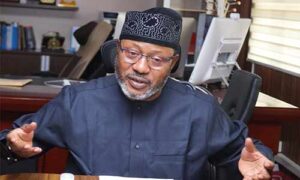The Federal Government of Nigeria is set to spend $39.67 billion, to address the climate change situation in the country.
The Minister of Environment, Mohammed Abdullahi, made this known on Wednesday at a side event organized by Climate Action at the ongoing COP27 in Egypt.
Read Also: How AMCON Recovered N307bn Debt In Two Years

The Minister said the Federal Government is spending nine percent of the country’s Gross Domestic Product to address climate change in Nigeria,
According to data sourced from the World Bank, Nigeria’s GDP stood at $440.78bn in 2021, Nine percent of this figure is $39.67bn; hence, Nigeria may spend around this amount in tackling climate change, based on the disclosure of the Federal Government.
“Abdullahi revealed that Nigeria submitted a highly ambitious Nationally Determined Contributions and is spending up to nine percent of its GDP in addressing climate change,” the ministry stated.
The minister told participants that in 2021, Nigeria became the first African country to design a detailed Energy Transition Plan to tackle energy poverty and climate change, as well as deliver universal access to energy by 2030 and net zero by 2060.
He also told the gathering that Nigeria was going through severe climate change issues.
Abdullahi called on African leaders to take decisive actions to mitigate the impact of climate change, stressing that the continent was at a critical time concerning the world’s climate future.
Outlining some devastating effects of climate change in Nigeria and other parts of the world, Abdullahi said, “Our actions today and over the next few decades will determine the fate of future generations and the planet.
“This year, we witnessed disastrous extreme weather events from terrifying wildfires in the United States to unprecedented heat waves in India, Pakistan, and Europe, to powerful floods in my country, Nigeria.
Read Also: Investors Meet Ogun Government Over Oil Refinery Project

“These devastating floods have affected about 33 states, displacing over 1.4 million people, destroying over 100,000 hectares of farmland, and causing about 600 deaths.”
The minister continued, “In addition, we are witnessing increased desertification, erosion, and pollution; the impacts of which are too severe to ignore.
“These glaring climate signals indicate that we do not have the luxury of time when it comes to the impacts of climate change.”
Speaking further, Abdullahi emphasized that Africa, despite contributing the least to both historical and current emissions, was currently shouldering the brunt of the impact of climate change to a disproportionate level.
This, he said, called for accelerated climate action.
He stressed that African leaders should strongly demand urgent and decisive climate action from developed countries that were most responsible for the emissions that cause climate change.
“We cannot afford any more delays; our people and nations are on the line,” Abdullahi stated.
He called the attention of investors and the international community to the investment opportunities inherent in the Energy Transition Plan of Nigeria, advocating continued global collaboration in the drive to tackle climate change.

